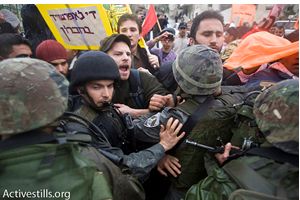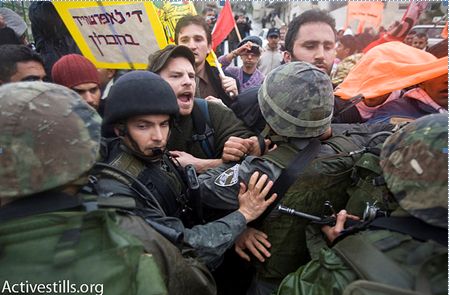
On Friday, February 24, 2012, a demonstration against the closure of Shuhada Street to Palestinian pedestrians and vehicles was held in Hebron. Shortly before it ended, and completely unrelated to it, the Fanun family was preparing to lay ‘Abd al-Mun’im Fanun, who died the day before, to rest in the Muslim cemetery in Tel Rumeida. The way to the cemetery passes near where the demonstration was taking place. Before the funeral procession arrived at the cemetery, it encountered occupation forces: border police and soldiers. The family tried to talk to the border police officers who were at the scene so that they would allow the procession to reach the cemetery, but to no avail. A few minutes later, a security force vehicle sprayed a foul smelling liquid (“skunk”) on the demonstrators, who had remained on the street, and on the deceased’s body and the mourners.

Protest calling to open the Shuhada Street, Hebron, Palestine, February 2010 (Photo: Activestills)
Over the years, Israel established a number of settlement points in and around the Old City of Hebron which had traditionally served as the commercial center for the entire southern West Bank . Israeli law-enforcement authorities and security forces have made the entire Palestinian population suffer in the process of protecting Israeli settlement in the city. The authorities impose a regime intentionally and openly based on the “separation principle”, the result of which is legal and physical segregation between the few Israeli settlers and the Palestinian majority.
This policy led to the economic collapse of the center of Hebron and drove many Palestinians out of the area. The findings of a survey conducted by B’Tslem in November-December 2006 show that at least 1,014 Palestinian housing units in the center of Hebron have been vacated by their occupants. This number represents 41.9 percent of the housing units in the relevant area. Sixty-five percent (659) of the empty apartments became vacant during the course of the second intifada. Regarding Palestinian commercial establishments, 1,829 are no longer open for business. This number represents 76.6 percent of all the commercial establishments in the surveyed area. Of the closed businesses, 62.4 percent (1,141) were closed during the second intifada. At least 440 of them closed pursuant to military orders.
The main elements of Israel ‘s occupation policy in the city are the severe and extensive restrictions on Palestinian movement and the authorities’ systematic failure to enforce law and order on violent settlers attacking Palestinians. The city’s Palestinian residents also suffer as a direct result of the actions of Israel’s occupation forces.
Related:
Video – “Skunk” liquid sprayed on a funeral, Hebron (1.40 m.): http://www.youtube.com/watch?v=adhGYqdjIsg&feature=player_embedded
The demonstration in Hebron, last Friday, against occupation: Palestinian killed in Qalandia checkpoint Hebron MK Barakeh injured during a demonstration


